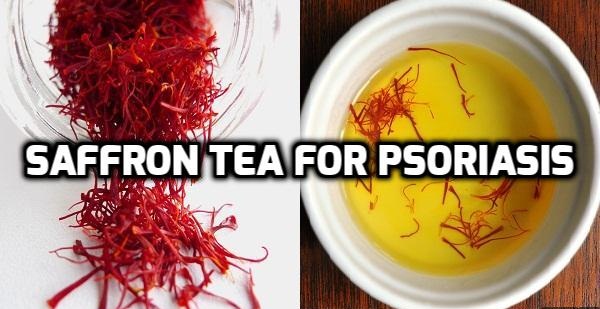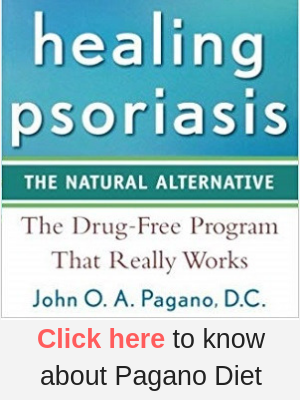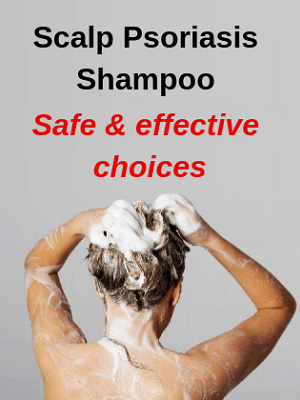For the holistic healing of psoriasis, use of herbal teas is highly recommended. In the previous post, we have discussed in detail about the benefits of slippery elm bark tea for psoriasis. This post would be dedicated to saffron tea.
Let us know Saffron
Saffron is a plant. The inner parts of the flower of saffron plant are dried to get the saffron spice. These dried stigmas are very light weight. It takes more than 100000 dried stigmas to make about a pound of the saffron spice. These dried stigmas are red-orange in color. When the saffron spice is immersed in hot boiling water, these saffron blossoms dissolve to produce yellow colored tea. That’s why it is also called as yellow saffron tea.
Due to the high cost, saffron is rarely used as a spice now. But, it is widely used as an herb due to its amazing health benefits.
American yellow saffron is much cheaper than Spanish saffron with no less health benefits. Hence, American saffron is more popular as an herb than Spanish one. John Pagano in his very famous book- Healing Psoriasis : The Natural Alternative– have clearly mention that American yellow saffron tea is advised for people dealing with psoriasis and eczema; not the Spanish one.
Benefits of Saffron tea for Psoriasis
Psoriasis is an auto-immune disorder, triggered due increased level of toxins in your body beyond the safety limit. When the intestinal walls become thin (porous) and allow the passage of undigested food particles, pathogens (disease causing bacteria) and other wastes into your blood stream, these body toxins circulate throughout the body and accumulate in the body cells. It is known as leaky gut syndrome. Your liver would need to overwork to flush out these toxins from your body. Gradually, the liver would become ineffective and then these toxins would try to make an exit from your body through the skin. It would result in psoriasis patches on various parts of your body.
Genetic issues, stress and anxiety, chronic constipation and indigestion, food intolerances, chronic alcohol consumption, long term use of steroids and antibiotics- one or more of these factors can increase the level of toxins in your body.
Read more: Body toxins and Psoriasis
Saffron tea can help in the repair of the intestinal walls to heal leaky gut syndrome. Dr Pagano has strongly advocated the use of saffron tea along with slippery elm bark tea to heal psoriasis.
Saffron is a powerful detoxifying herb. It detoxifies the whole digestive tract- from mouth to anus, particularly the liver and kidney. Saffron dilates the blood vessels naturally to encourage sweating and opening of skin pores. It results in skin detox.
Saffron tea is an intestinal antiseptic. It heals the intestinal lesions and reduces gut inflammation, pain and irritation.
It aids in digestion by boosting the circulation so that all the organs of digestive tract get enough blood supply to stay healthy and active.
Edgar Cayce, known as the father of holistic healing movement, is a big fan of saffron tea for psoriasis healing. He recommends saffron tea, slippery elm tea and small amount of olive oil as a part of diet regimen to treat psoriasis.
Going beyond detoxification
Saffron is not only a detox herb, it has a lot more to offer you:
- Anti-depressant
Stress is a well known culprit for psoriasis. Saffron tea can help you cater stress, anxiety and depression. Saffron tea is also known as “liquid sunshine” because it can uplift your mood to feel positive. It is quite effective in treating mild to moderate depression.
A research study published in the Journal of Ethno-pharmacology, September 2004 edition states that taking 30 milligrams of saffron a day continuously for 6 weeks is as much effective as taking 20 milligrams of fluoxetine (a conventional drug) to treat depression.
- Helps in weight loss
Saffron tea can reduce the intensity of hunger and can help you lose some weight without much effort. There is a saying- fasting treats psoriasis. When you don’t eat much; when you give your sluggish body metabolism some time to relax and repair; when you give your over burdened digestive tract to take a break- your psoriasis is bound to get relieved.
Read more: Obesity and Psoriasis
- Reduces cravings for sugar
Saffron tea reduces the craving for sugar. As we all know, refined white sugar is not good for psoriasis. Hence, drinking saffron tea can help you to stay away from this unhealthy food without much trouble.
Read more: Refined white sugar is bad for Psoriasis
In a study in the Journal- Nutrition Research, women participants experienced significant reduction in the cravings for sweets and decrease their consumption of snacks by more than 55% after consuming saffron extracts.
- Reduces lactose intolerance
About 20-25% of people dealing with psoriasis have food insensitivity- mainly to gluten and dairy. Some pages on the internet says that saffron can help in reducing lactose (dairy) intolerance. But, I couldn’t find any reliable research paper or case study to confirm this claim.
How to make Saffron tea
Take 1 teaspoonful of saffron threads and pour 2 cups of hot boiling water over it. Let it steep for 15-20 minutes. Strain (optional) and drink it. Drink it every day.
The best time to drink saffron tea is at night before going to bed. In the morning, you should drink Slippery elm bark tea.
It is important to maintain a time gap of 8-10 hours between drinking slippery elm tea and saffron tea. Slippery elm tea coats the digestive tract whereas saffron tea flushes the liver and kidney. Hence, both these teas impart sort of opposite effect. Drinking them within a short span of time would sort of nullify the effect. Hence, drink slippery elm tea in the morning and saffron tea at night.
Read more: Slippery elm bark tea for Psoriasis
What about Saffron water
If you are dealing with severe psoriasis and looking for quicker results, you can replace your drinking water with saffron water. Take a gallon of drinking water and mix 1 heaped teaspoon of saffron tea threads in it. Let is steep for 20-30 minutes and then strain it. Your saffron water is ready. It would be light yellow-orange in color. Replace your normal drinking water with it. Saffron water is, obviously, less concentrated than saffron tea. But, the cleansing action is no less than saffron tea because you are taking saffron with every sip of water that you gulp in.
Drinking saffron water flushes the liver and kidney by stimulating urination to get rid of accumulated toxins.
Dr Pagano has quoted in his book that using saffron water (in place of normal water) for facial sauna can bring wonderful results to manage psoriasis on face and forehead becauses it increases perspiration and promotes skin detox. Though the real healing comes from inside with the help of elimination diet, positive lifestyle and dietary supplements and herbs- using facial sauna help tremendously to manage the physical symptoms of psoriasis on face.
Read more: Using facial sauna to manage psoriasis on face
How it tastes
Saffron tea is quite drinkable without any additives. Some people say that it tastes good. For me, it is neither delicious not awful. In the quest to heal psoriasis, I have gulped far more bitter things in the past. Hence, saffron tea is pretty fine to me.
I would suggest you to drink it plain, without any additives. I am sure you would not find it too difficult.
Precautions
In general, saffron tea doesn’t possess any side effects.
- Pregnant women should not drink it because it can cause miscarriage (although it is very rare). Consuming moderate to large quantity of Saffron tea stimulate the body metabolism to increase heat in the body and also, can cause uterine contractions. That’s why it was used for abortions in earlier times. Consumption of small amount of saffron tea should not have such effect, but, to be on safer side, pregnant ladies should avoid it.
- In general, whatever is not good for pregnant ladies, is assumed to be prohibited for breast feeding women also. That’s why it is not recommended for nursing ladies also. But, there are no documented side effects of saffron tea for breast feeding women. To be on safer side, nursing ladies should consume it in small quantities only. For example- one quarter to half teaspoon of saffron threads immersed in one cup of warm water. Just one drink per day.
- Excess of anything is bad. It applies here also. Too much consumption can cause yellowing of skin and eyes along with vomiting, diarrhea and dizziness.
- Saffron tea imparts a mild diuretic effect to cause frequent urination. Hence, if it bothers you, then reduce the amount by half- from 2 cups to 1 cup every night.
- If you have tried chamomile tea before and you didn’t go well with it, then there are high chances that saffron would also irritate you because there both trees belong to the same botanical family.
How to check the quality of Saffron
Saffron is one of the costliest spice cum herb. Hence, people can try to sell you inferior quality saffron to make more money. Let us learn a very simple and effective way to check the quality.
Just dissolve a few threads of saffron in cold water. If the color of water changes immediately, then it is fake.
For more accurate results, wait for 10 minutes. After 10 minutes, take the saffron threads out of the water and check their color. If they are completely discolored and water has become orange in color, then it is fake saffron.
Pure saffron threads, when taken out of the water after 10 minutes, would not lose their color completely. Also, the water color would be yellowish and not orange.
From where to buy
Not sure if you can find American yellow saffron tea and Slippery elm bark tea from a store near to you. Click the below Amazon links to buy online: –
| USA readers | India readers | UK readers | |
|---|---|---|---|
| Saffron tea | Click here | Click here | Click here |
| Slippery elm bark tea | Click here | Click here | Click here |
| Saffron tea + Slippery elm bark tea (Combo) | Click here | ---- | ---- |
References
http://www.meridianinstitute.com/echerb/Files/1ysaffro.html
http://cayce.com/saffron.htm
http://www.edgarcayce.org/are/holistic_health/data/resaffro.html





Ashish,
I am planning to try saffron for psoriasis. I am currently breastfeeding my 18 month old. In reading you state the saffron is harmful to baby. Can you please share with me how it is harmful? Have there been studies on this? Thanks in advance, Elisha